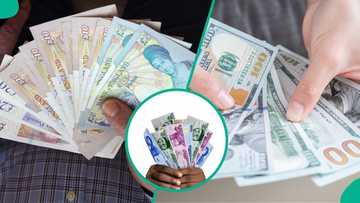Naira Bounces Back as Nigerian Banks Resume International Transactions on ATM Cards
- Nigeria's naira has strengthened after banks resumed international transactions using naira debit cards, following a three-year pause
- Major banks made this move as foreign exchange liquidity improved, thanks to economic reforms and increased investor inflows
- Analysts link the positive trend to higher oil prices, CBN policies and reforms that stabilised the exchange rate and improved access to dollars
Legit.ng journalist Victor Enengedi has over a decade's experience covering Energy, MSMEs, Technology, Banking and the Economy.
Nigeria’s currency, the naira, has recently become stronger. This happened after banks allowed customers to start using their naira debit cards for transactions outside the country again.
Recall that in early July 2025, Nigerian banks began the reactivation of naira-denominated debit cards for international transactions.

Source: Getty Images
For over three years, customers could not use these cards abroad because of limited access to foreign exchange. Now that there is more money available, this restriction has been removed.
The naira gained a little value in the parallel market on Friday, trading at N1,550 per dollar, which is N5 stronger than the N1,555 rate from the day before.
However, in the official market, it dropped by N1, moving from N1,531 to N1,532 per dollar, based on data from the Central Bank of Nigeria.
Throughout the week, the naira stayed within the N1,500 per dollar range in both markets despite some ups and downs.
Major banks reactivate global naira card transactions
Several top Nigerian banks, including UBA, FirstBank, GTBank, and Wema Bank, have resumed international use of naira debit cards.
This is a big change from when banks stopped such transactions due to a shortage of foreign currency. During that time, only cards funded with dollars from domiciliary accounts could be used abroad.
Now, with better access to foreign currency, banks are restoring global services for naira cards, Daily Trust reports.
UBA informed its customers that this decision reflects its goal to improve customer experience and make banking more convenient.
Economic reforms help boost foreign exchange supply
Experts from Financial Derivatives Company Limited say the recent increase in foreign exchange inflows is largely due to rising oil prices and new channels introduced by the Central Bank of Nigeria to attract foreign currency.
In a separate report, Ayokunle Olubunmi, head of financial institution ratings at Agusto & Co, noted that better access to foreign exchange has encouraged banks to reopen international transactions on naira debit cards.
He also mentioned that the narrowing gap between official and parallel market rates, along with fewer opportunities for arbitrage, influenced the banks' decision.
Over the years, many banks such as Stanbic IBTC, UBA, Access Bank, Standard Chartered Nigeria, and GTBank have either reduced international spending limits on naira cards or completely suspended overseas use unless the cards were funded with foreign currency through domiciliary accounts.
According to analysts, reactivating naira card usage for international travel makes it easier for Nigerians to pay for hotel bookings, flights, and other services abroad using their regular debit cards.

Source: Getty Images
FG tackles exchange rate issue with new initiative
Legit.ng earlier reported that Nigeria and Japan have launched a strategic venture capital initiative aimed at providing naira-based financing to high-growth companies.
The goal of this effort is to offer long-term, concessional finance that shields businesses from exchange rate fluctuations.
As part of finalising the fund's structure, Mr. Wale Edun, Nigeria's Minister of Finance and Coordinating Minister of the Economy, held discussions with officials from the Japan International Cooperation Agency (JICA) and the Nigeria Sovereign Investment Authority (NSIA) in Abuja.
Source: Legit.ng





